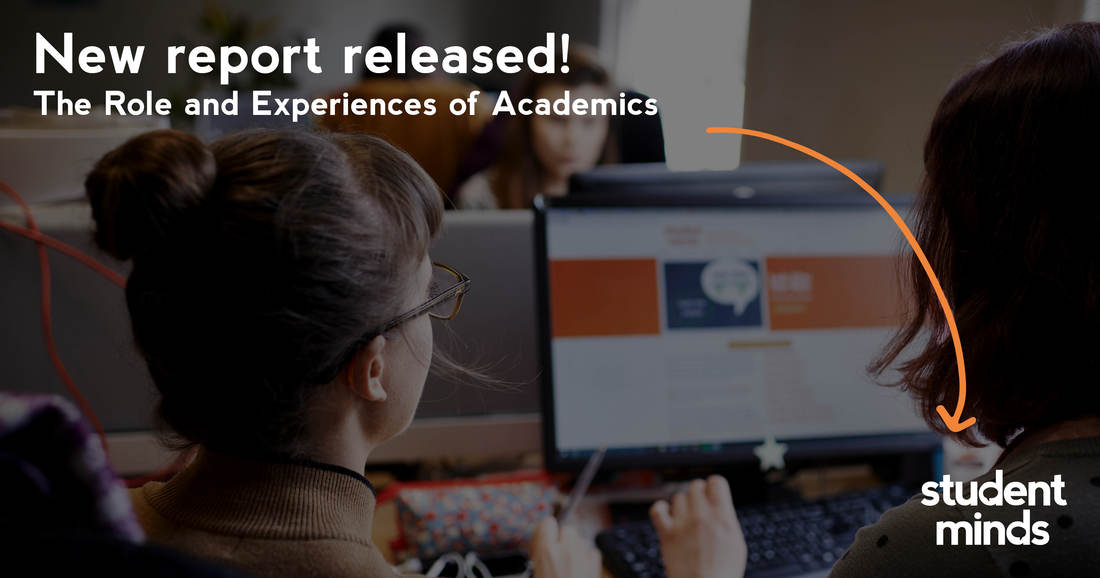Student Minds call on universities to review the role of academics in student mental health29/1/2018 Student Minds works with various members of the university community; students, Student Services staff, Students’ Union colleagues and University Sport and accommodation staff. Through these networks and a number of our research projects (Grand Challenges, Student Voice Forum), recurring concerns have arisen about the role of academics in supporting student mental health. In response, in 2016 we commissioned research to be undertaken directly with academics to better understand their experiences.
Today we release the findings of this research, with the launch of our report Student Mental Health: The Role and Experience of Academics which provides new insights into the role of academics in supporting student mental health. The report authors, Dr Nicola Bryom and Gareth Hughes, interviewed 52 academics with diverse experience, at five universities. These academics identified that responding to student mental health problems is now an inevitable part of the academic role. However, this crucial frontline role is currently invisible, and the higher education sector does not currently have the appropriate structures or cultures to assist academics. Researcher, Dr Nicola Byrom, told us “Interviewing people for this project, I was struck by the depth of care and concern most academics felt for their students and by the deep sense of frustration felt in the situations where adequate support was not readily available for students.’ What does this mean for universities? In 2017 Universities UK published the #StepChange framework, encouraging leaders across the Higher Education sector to take a whole university approach in response to student mental health. Many universities are now developing their response to Step Change. Our research demonstrates that academics need to be a priority area within the development of an institution's mental health strategy and their wider organisational strategy. Academics are often a student’s key point of contact , and this interaction can significantly impact on a student’s experience. For a university to progress towards a whole-university approach, they must ensure that the role of academics in relation to student mental health is functioning well. One of the report authors, Gareth Hughes, commented: ‘"I hope this research helps us all to think a bit more clearly about what we mean by a whole university approach to mental health. For me personally, there are four key lessons from this report; 1. we need to be clear about what we expect of the academic role, 2. we need to recognise that signposting is a complex task, 3 we need closer working relationships between academics and student services and 4. across the sector, students services need to be resourced so they can meet the needs of students, so that academics aren't put in situations where they are providing this level of support to students."’ We hope that this report encourages universities to recognise the benefits of providing additional support to students and academic departments around mental health - such as resourcing senior academics to put in structures to support the wellbeing of their staff. . This will have a range of positive outcomes for students, staff and the institution. As Dr Nicola Byrom points out ‘Our research indicated that resourcing Student Support Services could free up academic time and energy for teaching and research while ensuring better outcomes for students and reducing institutional risk.’ Commenting on the research, Rosie Tressler, CEO of Student Minds said, ‘This research is the first study to really get to grips with the role of academics within student mental health - both the positives and the challenges of this. Evidently Academics are a vital but often unrecognised part of the support available to students at universities. Students will reach out to whoever they feel comfortable with, so in order to ensure that students get quick access to support, institutions must support academics to be mental health literate and have roles with clear boundaries, whilst improving collaboration between academia and student services. This must be backed on a strategic level through a whole university approach to student mental health and wellbeing. This work wouldn’t have been possible without the openess and honesty of academics and students. We hope that senior university leaders will follow our lead and ensure they truly co-produce their solutions and strategies with those who are on the frontline, as that’s how we’ll transform the health of the university community.” For a full list of recommendations and the report visit: www.studentminds.org.uk/theroleofanacademic
1 Comment
Your comment will be posted after it is approved.
Leave a Reply. |
Latest news
July 2024
|
- About
-
Find Support
- Get Involved
- Training
-
News and Publications
- Latest news
-
Research and publications
>
-
Reports
>
- Student Mental Health Manifesto
- Climate change and student mental health
- Part-time, distance learner and commuter students
- International Students
- Life in a Pandemic
- Supporting Students with Eating Disorders
- The Role of an Academic
- LGBTQ+ Research
- Student Voices
- Graduate Wellbeing
- Grand Challenges
- University Challenge
- Looking After a Mate
- Summary of HEFCE’s Report
- Consultation Responses
- Insight Briefings >
- Student Advisory Committee Reflections
- Good practice guides >
-
Reports
>
- Support Us
- Donate
|
|
Student Minds is registered with Companies House, 07493445
Student Minds is a Charity registered in England and Wales, 1142783 |


